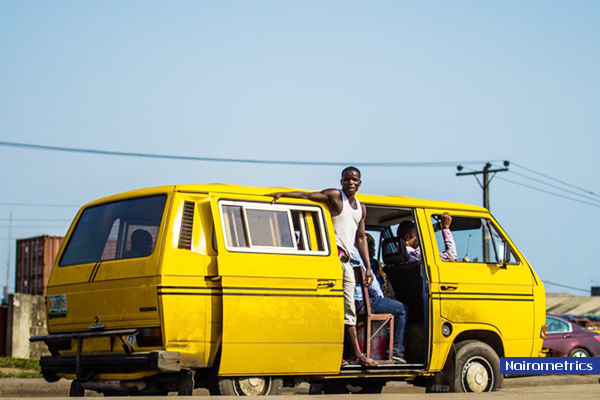The sun was out when I set out after noon on Wednesday. A friend had visited earlier and was just about to leave. I pulled on my pink Adidas face cap, walked him to my street gate where he took a bike, then I decided to take a walk to Bode Thomas. It took me about 30 minutes, walking briskly to get to Alaka bus stop. Despite my cap, beads of sweat had already formed on my forehead. As I turned to head back home, I thought to myself, “This is probably as good a time as any to do your conductor experiment.”
For some time, I’d wondered to myself what it was like to be a bus conductor. They always fascinated me. Everyone looks at them disdainfully and with good reason: most of them are touts; but I was convinced that there was more to them than immediately met the eye. How did they manage to collect money from and disburse ‘change’ to passengers without making mistakes? What was it like to ‘hang’ on the doorway of a speeding bus for over 5 kilometres? These were some of the questions that led me to consider the “conductor experiment”. The experiment was simple: be a conductor for a while so that I can see things from the conductor’s point of view and hopefully answer the questions that I had.
So, instead of turning to walk back home, I took a 50 naira bus to Barracks. I could have walked, but I was conserving my energy for what I knew would be a physically tasking experience. It turned out to be a very wise decision.
When I got to Barracks, I approached a conductor and explained: “Sorry, excuse me please. My name is Chuka. I am a researcher. I’m currently carrying out an experiment which involves me being a conductor in your bus for a few trips. Hope you don’t mind?” He looked at me like I was mentally ill, walked away and continued his calls of, “Ikeja, Ikeja under”. I approached about 7 more saying the same thing, sometimes in normal English, sometimes in Pidgin English. I got very similar reactions each time. Some even looked at me in disgust before moving away while some verbally abused me. “E be like say you dey mad ni? You just wan come insult me abi wetin?” one had said as he gave a long, drawn out hiss and walked away. About 40 minutes later, just as I was about to give up and call it a day, I saw Peter.
I knew Peter from well over a year ago, when I was still working in Ikeja. Before I bought my car, I used to board Peter’s bus on my way to work. At the time, whenever he saw me coming down from the pedestrian bridge, he would run up to me and say, “Oga, oya come enter, e don almost full.” More often than not, I would oblige him even if his bus was near empty, unless I was in a hurry then I would just dismiss him and reply, “No vex, next time.” Such was my relationship with Peter.
When I saw him, he had just jumped down from his still moving bus screaming, “Ikeja! Ikeja! Ikeja! Enter with your 250 change o!!!” as his bus slowed to a stop. He was his usual smiling self and as I wondered if he would still recognize me, he shouted, “Oga!” and ran towards me. “Loooong time o! E don tey wey I see you for here. Come enter na, the bus go full now now. Abi no be Ikeja you dey go?” I smiled – still the same Peter I always knew. “See as you just dey fresh anyhow.” I told him as he grinned. “Abeg eh, e get wetin I need your help with,” I continued. “I dey do one experiment like that and I need be conductor for like 1 or 2 trips to complete am”.
He looked confused. “You say?” I repeated myself. He looked even more confused. “How big man like you go wan become conductor? This conductor work no easy o! Even to be agbero sef easy pass am!” “No, no, no. No be say I wan become conductor,” I corrected him, smiling, “I just wan do am for 1 or 2 trips. I wan use am for one experiment like that.” He agreed. He told his driver, “Pilot, this guy say him want help us o.” “Abeg, we no need him help, I no get white (50 naira) to give anybody.” the driver replied. “No o! Him no dey find money. Na my guy, na why.” “Na you go pay am o! I don talk my own finish.” “Ok. No wahala.” Thus, began my experience as a conductor.
I started calling passengers, “Ikeja! Ikeja! Ikeja under bridge!” For some reason, all the passengers seemed to be ignoring me. Some were even clearly walking away from me. Bewildered, I asked Peter “Why them no dey answer me na? Abi e get how I suppose do mouth again to call Ikeja?” He looked at me and laughed, “You no see as you fresh? You no resemble conductor na. Nobody wan enter ‘one chance’.” “This thing wey I wear?” I asked him. I wasn’t dressed spectacularly. I wore a pink T-shirt on a black pair of corduroy shorts, a slightly faded pink face cap and my grey crocs. “See you.” He replied, as he continued laughing and calling passengers. Frustrated, I took off my shirt, rolled it up and squeezed it into the back pocket of my shorts so that I was only putting on a white singlet while I also turned my cap around and wore it backwards. Almost like magic, passengers started responding to my calls. I had scaled the first hurdle.
When the bus got filled up, I was a quite excited to ‘hang’ on the entrance of the bus (I had learnt how to by observing scores of conductors over the years). Peter waited until the bus had started moving, ran up to the bus, and jumped on just as the bus was picking up speed. This was going to be an adventure. My adventure was almost cut short as the bus galloped through a patch of bad road, at the foot of the Jibowu bridge, almost throwing me off my perch at the entrance. Peter noticed and proceeded to show me how to ‘hang’ properly. “No put your hand outside, you go just fall ni. Put your hand inside like this”, he said as he re-positioned his hand to hold on to the roof of the bus from the inside. “Once your hand dey like this, you no fit fall” he said as he stretched himself further out from the bus to demonstrate the safety of his hand grip.
When it was time to collect the transport fare from the passengers, I begged him to let me do it and he obliged. As I freed my right hand from my grip of the underside of the roof to collect the fares, he quickly stopped me. “You go just fall o!” he exclaimed. “No comot your hand like that,” he continued. “When you wan collect money, stay like this,” he said as he bent down into the bus with one hand balancing on the chair in front of him. “Then if you wan count am, na like this you go stay,” he continued as he adjusted himself so that his neck and upper back rested against the underside of the roof. I followed suit, balancing myself to collect the fares from the passengers. When I spoke, “Oya, your money line by line,” I could see Peter trying hard to stifle a laugh and a perplexed look on many a passenger’s face. “Talk normal”, Peter whispered to me. My voice sounded different. I could hear it sound deeper, coarser and somewhat unnatural. I wasn’t trying to change my voice; it must have been a subconscious reflex. I caught myself and changed it back. However, the perplexity never left their faces.
After collections, as I adjusted myself to count the money, “Conductor, give me my change.” rang out from virtually every corner of the bus. Almost every passenger had their hands outstretched as they continued in almost choreographed unison, “Conductor, my change!” That was when I realized that I wasn’t sure of who I owed how much, as I hadn’t taken adequate notice of that. I was quite overwhelmed and did the only thing left to do: I started giving out change as they asked for it while hoping they weren’t all lying cheats. Luckily, I have a good memory so I could tell if someone asked for change twice but I couldn’t tell when someone asked for change which they shouldn’t be getting. Thank God Peter took up the responsibility of announcing bus stops while we simply directed all the ‘agberos’ asking for money at bus stops to the driver or I don’t know how I would have coped.
When we got to Ikeja, after the last few passengers alighted, we counted the money and realized it was short by 150 Naira. I must have given someone change when I shouldn’t have or given out more change than I should have. Needless to say, I paid for that shortage from my pocket. Experience does after all, come at a price. On the trip back, I just observed Peter as he went about his business effortlessly. He juggled all the tasks with so much grace; he made it all seem so easy. If only I didn’t know better.
I conducted the next 3 trips after that, getting better with each trip. By my fifth trip, I had fully gotten the hang of it. I called passengers, collected fares, disbursed change, announced stops (I knew the names of all the bus stops from my days commuting to work at Ikeja by bus), at a point, I even stretched myself away from the bus like Peter did earlier to show that I had gotten the hang of perching properly on the bus entrance. By the time we were on my last trip back (which should have been my 6th trip), I was tired as a log of wood and even slept off through about half of the trip.
My experience as a conductor, while immensely interesting, also taught me a number of lessons about life:
- As much as it depends on you, be at peace with all men. If I wasn’t friendly with Peter all those months back, my experiment would have failed.
- First impression matters, dress the part; but when you’re in, let your voice be heard, your true voice. Passengers didn’t respond to my calls until I took off my shirt and turned my face cap backwards; however, when they had entered the bus, they needed to hear my true voice.
- Remain focused at all times. My momentary lack of focus which made me lose track of who I owed how much cost me 150 Naira.
- Divide and Conquer. There’s no way I would have coped if I had to announce stops and deal with the ‘agberos’ in my first trip; even in subsequent trips, the driver always dealt with the ‘agberos’, he was much better than either of us at handling them.
- Practice makes perfection. The more trips I took, the better I performed my “conductor duties”.
As well as some insights into the Economics of being a Bus Conductor:
- The appearance is by design; it’s a part of the marketing.
- You must be a good salesman. “Oga, oya come enter, e don almost full” and “Come enter na, the bus go full now now”, even when the bus was near empty are classic sales pitches designed to maximise customers.
- Accounting knowledge (without the aid of Computers) is compulsory. You need to keep track of who you owe how much else, you lose money.
- Learn to delegate upwards. Peter knew his ‘Pilot’ was better at handling the touts on the road so he delegated that duty to him.
- Physical fitness cannot be compromised. Your success as a conductor depends on, more than anything else, your physical fitness.
Overall, I realized being a conductor is both physically and mentally demanding. Conductors don’t have an easy job. However, I had an amazing time being a conductor and I will try to apply these lessons to my life and business. I hope you do too.
PS: Peter’s name has been changed to protect his anonymity.
Chuka is a behavioral economist and writes regularly on his medium page.




















